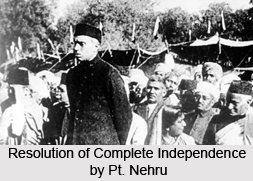 Demand for Purna Swaraj was made by the members of Indian National Congress like Jawaharlal Nehru, Sardar Vallabhbhai Patel, for the proper functioning of the India. While, Netaji Subhas Chandra Bose was in hands with Japan and Germany for the formation of Indian National Army in Singapore.
Demand for Purna Swaraj was made by the members of Indian National Congress like Jawaharlal Nehru, Sardar Vallabhbhai Patel, for the proper functioning of the India. While, Netaji Subhas Chandra Bose was in hands with Japan and Germany for the formation of Indian National Army in Singapore.
Failure of Cripps Mission
The failure of the Cripps Mission brought about disappointment and the most dissatisfaction amongst the Indian leaders. He wanted to bring about a settlement between the Government and the Congress with remorseless efforts. But after the failure of the Cripps Mission the progress was impossible without an agreement between the Congress and the League. As a result, wide difference had developed between the Congress leaders and the Muslim League High Command, Mohammad Ali Jinnah. Nevertheless, on 23rd April 1942, C. Rajagopalachari managed to get two resolutions passed by the Congress members in the Madras legislature. One of the most vital of these resolutions required that the Congressmen should acknowledge the Muslim League`s claim for separation. Thus, negotiations started with the Muslim League for the `purpose of arriving at an agreement and securing the installation of a national government to meet the present emergency.
Muslim League and Indian National Congress
A major transformation in India was seen after the passing of the resolution yielding the Muslim League`s claim for separation. Although, the Muslim League celebrated the occasion of acceptance of Pakistan, yet a feeling of resentment against Rajagopalachari was seen among the Congress leaders. The All-India Congress Committee rejected Rajagopalachari`s resolution by an overwhelming majority and adopted a counter-resolution. The resolution stated that `any proposal to disintegrate India by giving liberty to any component state or territorial unit to secede from the Indian Union or Federation will be detrimental to the best interests of the people of the different States and provinces and the country as a whole and the Congress, therefore, cannot agree to any such proposal.
Purna Swaraj and Mahatma Gandhi
Mahatma Gandhi started a series of articles in the "Harijan" and urged the British to ` Quit India`. Furthermore, the Congress put forth the resolution and demanded that British rule in India must end immediately. They stood resolute with their demand for Purna Swaraj. It was believed that the Congress demand for termination of British rule was required to settle the communal problem in the country. According to the Congress, effective resistance to foreign aggression is not possible till the British authority lasted. In addition to that, the latest decision of the Congress Working Committee on July 14, 1942 was to resolve to launch a mass movement if the British do not withdraw from India. The mass movement would coerce the British Government to concede a system of government and transfer power to that government, which would establish a Hindu Raj immediately under the guidance of the British.
Reaction of British Government in India
On the issue of the demand for Purna Swaraj, the reaction of British Government in India was stiff and uncompromising. Indian National Congress demand of termination of British rule would completely disrupt the governmental machinery. After this incidence, the All-India Congress Committee met in Bombay (now called Mumbai) on 7th August. It again approved that the Working Committee`s resolution demanded the immediate end of British rule. But in the early hours of 9th August, M.K Gandhi and the members of the Working Committee were arrested. Over the period of time, all important leaders of the Congress throughout the country had been taken into custody. Moreover, the Congress committees were declared unlawful associations by the British Government. The arrest of the Congress leaders brought about a serious disorder in the country. The Government however was ready and took firm steps to suppress the disturbances.
Meeting of MK Gandhi and Jinnah
The Gandhi-Jinnah meeting took place on 9th of September 1944 to discuss the Partition of India. The talks continued under a veil of secrecy till the 27th, when the correspondence which had accompanied the talks was released and the failure to reach agreement was announced. On 24th September, Gandhiji had made a concrete offer to Jinnah, stating that he was willing to recommend to the Congress and the country the acceptance of the claim for separation which was contained in the League`s Lahore resolution of 1940. He had proceeded on the assumption that India was not to be regarded as two or more nations, but as one family consisting of many members, including those Muslims living in Baluchistan, Sind and the North-West Frontier Province, parts of the Punjab, Bengal (now West Bengal) and Assam.



















